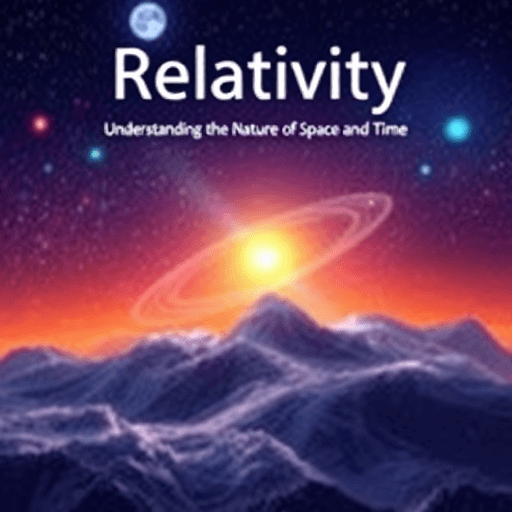Relativity: Understanding the Nature of Space and Time

Relativity is a fundamental concept in physics that describes the nature of space and time. It was introduced by Albert Einstein in the early 20th century and has since been widely accepted as a cornerstone of modern physics. It builds upon classical mechanics, like the Laws of Motion, but extends them to extreme speeds and gravitational fields.
Relativity: Unraveling the Mysteries of Space and Time
Albert Einstein's theories of relativity transformed our understanding of the universe, establishing the framework for modern physics. Relativity explains the intricate relationship between space, time, and energy, providing answers to questions about gravity, motion, and the nature of the cosmos.
Key Concepts in Relativity
Special Relativity
- Focuses on objects moving at high speeds relative to one another.
- Introduced the revolutionary idea that the speed of light is constant, regardless of the observer's motion.
General Relativity
- Provides a new understanding of gravity as the curvature of spacetime caused by mass and energy. This differs significantly from the classical view of gravity as one of the fundamental forces.
- Demonstrates how massive objects like planets and stars influence the fabric of space and time.
Phenomena Explained by Relativity
- Time Dilation: Moving clocks run slower relative to stationary ones, as seen in high-speed scenarios like space travel. For a more detailed explanation, see NASA's Space Place on Time Dilation.
- Length Contraction: Objects in motion appear shorter along the direction of travel to an outside observer.
- Gravitational Time Dilation: Time slows down near massive objects due to the distortion of spacetime. This distortion is directly related to the concentration of energy and thermodynamics in that region. This effect is crucial for the accuracy of GPS systems (see NASA's explanation of GPS and Relativity).
Relativity in Everyday Life
Astronauts and Space Exploration
Astronauts traveling at near-light speeds experience time dilation. Upon returning to Earth, they would have aged less compared to their counterparts who stayed behind.
GPS and Navigation
General relativity is critical for GPS technology. Satellites experience different time flows due to their speed and distance from Earth's gravity, and these effects are corrected to ensure accurate positioning.
Black Holes
Black holes exemplify relativity. Their immense gravity distorts spacetime, causing phenomena such as time stretching and gravitational lensing.
Test Your Knowledge!
Relativity can be challenging, but understanding its core principles helps. Take this short quiz to test your grasp:
-
What does special relativity describe?
a) Gravity and its effects on space and time.
b) High-speed motion relative to an observer.
c) Resting objects relative to a stationary observer.
Answer: b -
What is time dilation?
a) Faster time for observers in motion.
b) Slower time for stationary observers.
c) Slower time for observers in motion relative to a stationary observer.
Answer: c -
How does gravity affect time?
a) Time flows faster near a massive object.
b) Time flows slower near a massive object.
c) Time remains constant near massive objects.
Answer: b
Final Thoughts
Einstein's theories of relativity continue to inspire awe and wonder, shaping our understanding of the cosmos. From explaining the orbits of planets to uncovering the mysteries of black holes, relativity remains a cornerstone of physics.
Further Exploration
Einstein's own explanation of his groundbreaking theory can be found in Relativity: The Special and the General Theory. This book offers a fascinating insight into the mind of one of history's greatest thinkers. For a more modern and accessible explanation, we recommend Relativity for Everyone.
To further explore the mind-bending implications of relativity, consider reading Black Holes and Time Warps: Einstein's Outrageous Legacy by Kip Thorne.
Table of Contents
- Relativity: Understanding the Nature of Space and Time
- Relativity: Unraveling the Mysteries of Space and Time
- Key Concepts in Relativity
- **Special Relativity**
- **General Relativity**
- Phenomena Explained by Relativity
- Relativity in Everyday Life
- **Astronauts and Space Exploration**
- **GPS and Navigation**
- **Black Holes**
- Test Your Knowledge!
- Final Thoughts
- Further Exploration
Related Posts

Explore the principles of energy and thermodynamics. Learn about energy conservation, entropy, and the laws governing energy transfer and transformations.

Fundamental forces of nature explained: Gravity, electromagnetic force, strong nuclear force, weak nuclear force. Learn about their properties, range, strength, and mediating particles.

Learn how objects move with our guide to Newton's Laws of Motion. Discover the principles of inertia, force, and acceleration, and see how they apply in everyday life.

Dive into the fascinating world of quantum mechanics, unraveling the principles governing the atomic and subatomic realms.